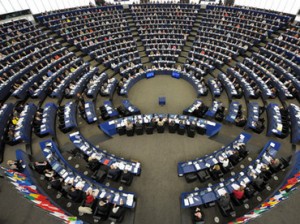
(AFP File Photo/ Frederick Florin)
The foreign ministry rejected a number of aspects in a resolution put forth by the European Parliament (EP) last week.
Foreign ministry spokesman Badr Abdelatty said: “The Egyptian people are the only ones to decide their fate and future,” in a statement issued on Saturday that was critical of the content of the EP’s resolution.
The spokesman added that no domestic or foreign party was entitled to comment on matters that fall under the responsibility of the judiciary, in reference to comments made by the parliament concerning the trial of journalists in Egypt. The Egyptian judiciary, which the statement said was “known for its independence and integrity”, was part of the country’s separation of powers and that no one “under any pretext” could interfere in its work.
Abdelatty also cited the acquittal of Al-Jazeera cameraman Mohamed Badr, who had been detained since July and stood trial with 61 others.
He added that it was “unacceptable” that the resolution “equates a party that practiced violence and terrorism against civilians” with “security forces and state institutions” that are responsible with “imposing public order and providing security”.
The foreign ministry also criticised the EP’s resolution for saying the referendum had a “relatively low turnout” and added that it rejected parts of the resolution critical of some articles that passed “with an overwhelming level of support”.
The ministry welcomed some points made in the resolution, especially those relating to the condemnation of violence and terrorism and parts that welcomed certain aspects of the newly passed constitution that dealt with human rights.
Abdelatty also approved of an article in the resolution that called for cooperation between Egypt and the European Union when it came to restoring smuggled funds and assets that had belonged to members of the foreign regime.
The resolution, which was published on Thursday, was critical of the political process in Egypt that was initiated with former president Mohamed Morsi’s ouster.
“The run-up to the referendum was marred by acts of violence and the harassment and arrest of activists campaigning for a No vote,” said the resolution, which added that such actions led to a “one-sided public debate ahead of the referendum”.
The resolution also welcomed the “positive elements” in the new constitution, which included fundamental freedoms and human rights, the protection of minorities, and women’s rights. However, it decried articles relating to the armed forces and its lack of civilian oversight and the constitution’s restriction of freedom of religious worship to the followers of the three Abrahamic religions.
The EP’s resolution also condemned “excessive force against protesters” and the crackdown on journalists.
The resolution also pointed to both the Muslim Brotherhood and interim government as inciting against one another. It additionally highlighted the increased sectarian attacks on Coptic churches following Morsi’s ouster and “acts of terrorism and violent attacks against security forces”.
MEPs of the parliament also issued a press statement calling on “all the political actors and security forces in Egypt to show the utmost restraint and avoid provocation and further violence”.
They also called upon the Egyptian authorities to fully and effectively implement the new constitution’s “provisions on fundamental freedoms, including the freedom of assembly, association and expression, and human rights”.
“The referendum on the constitution was an opportunity to build national consensus, reconciliation and stability in the country,” said the press statement, which then expressed “strong regrets at the violent clashes before, during and after the referendum”.
The Foreign Affairs Council meeting is scheduled to take place on Monday. According to the council, European ministers will discuss a number of Egyptian issues and “reaffirm the importance of the European Union’s relationship with Egypt and the EU’s continued support for the Egyptian people in their desire to establish a democratic and prosperous society that enshrines dignity, the rule of law and respect for fundamental freedoms and human rights.”
The council said it would “take stock of the situation in Egypt” to assess the constitutional referendum.
In a Thursday statement UK Foreign Secretary William Hague said he was “very concerned” about “increasing restrictions placed upon journalists and the media in Egypt”, adding that he would discuss related issues with other European foreign ministers at council meetings starting on Monday.




